Smart juicing: Here’s how to boost your health by blitzing fruit and vegetables
Are all juices good for you? Not always, says our nutritionist as she examines the benefits and challenges of juicing vegetables and fruit for optimum health
Ever since fitness enthusiasts discovered the benefits of juicing, it has become one of the trendiest ways to become super healthy. However, not everyone is convinced if it is the best route to good health, especially since the process of juicing involves extracting the juice from vegetables and fruit and stripping away most of the fibre, seeds and the pulp from the produce.
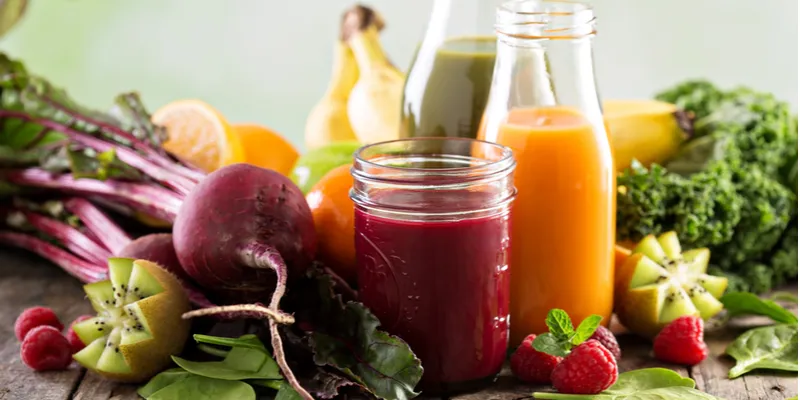
The global juicing market is growing by leaps and bounds
When it comes to any health trend that seems to offer a magic bullet for all your health challenges, it’s important to examine its benefits and challenges. The global juicing market is growing rapidly, fuelled by the belief that cold-pressed juices are very healthy. It is crucial to explore what is feeding the force behind this trend. If you keep hearing that juicing is the miracle you need, let’s give it some context.
Myths and facts associated with juicing...
Juicing gives you a health boost
You need to get more vegetables and fruits into your daily diet, but do cold-pressed juices really give you so many benefits? What is beneficial about juicing is the fact that it involves no heat, due to which the nutritive quality of the juice is retained. But since most of the vegetables and fruits are devoid of fibre after the juicing process, you are left with a potentially high sugar drink.
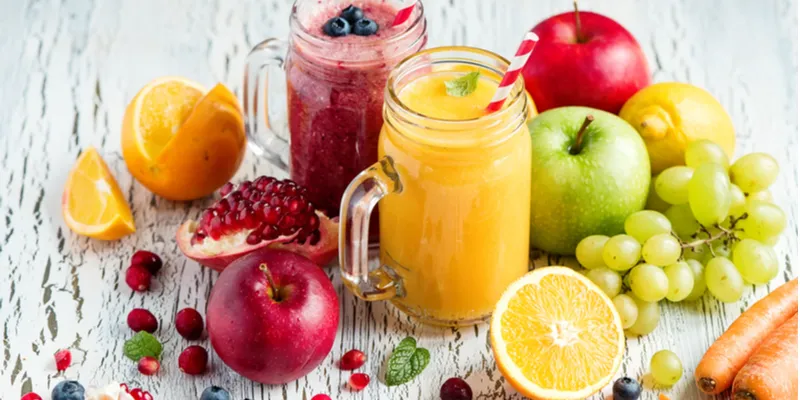
Many juices can be high in sugar
Since there is no fibre in the juice, your blood sugar can spike, and then crash later, causing fluctuations in cortisol. Without the fibre, the juice moves through your body quickly, leaving you craving for food in a short period of time.
Juicing does nothing to stabilise your mood. When your blood sugar spikes, especially during challenging times, you can risk making your immune system weaker by drinking too many juices.
However, the good news is that when you drink a glass of juice after a heavy meal loaded with fat, fibre and protein, the phytonutrients in the juice will give you extra energy. The nutrients in the juice will actually support your immune system.
Juicing can help detox the body
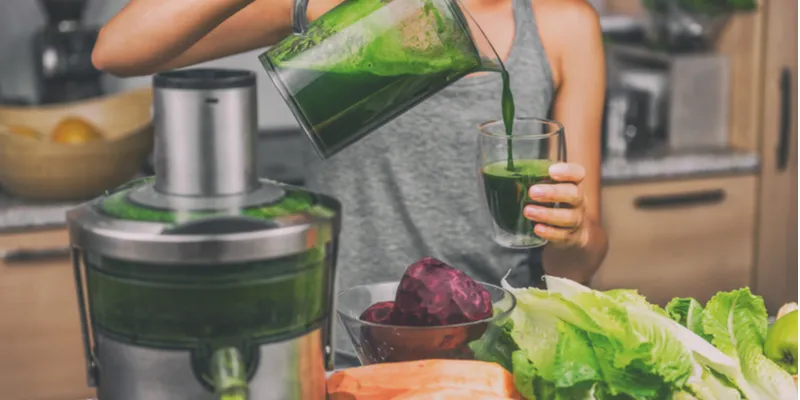
Juice can detoxify the body
Juicing has often been associated with detoxification. Many juices have excellent ingredients for detoxification and these include activated charcoal, chlorella, spirulina and ginger.
This may be true, but let’s look deeper. It’s common to see people falling prey to juicing as a detox, when the rest of the time, their diet is extremely toxic.
First things first. Make sure your diet is not highly toxic and inflammatory. Otherwise, juice might actually cause further disruption within your body. Secondly, if your diet is not balanced with adequate protein, healthy fats and complex carbohydrates, the detoxification expected from juicing may cause symptoms such as headaches, loose stools and skin breakouts.
I’ve seen people who do all day juicing fall sick after a day or two. The detoxification myth is the greatest myth of all, as you are not meant to be in a perpetual state of detoxification.
I believe that you have to move gracefully between periods of cleansing and building up the body. You might just want to consider one week of every quarter of the year for a gentle cleanse, rather than trying to detoxify your body every day. Focus instead on building strength with the right kind of foods.
Juices are loaded with healthy ingredients for everyone
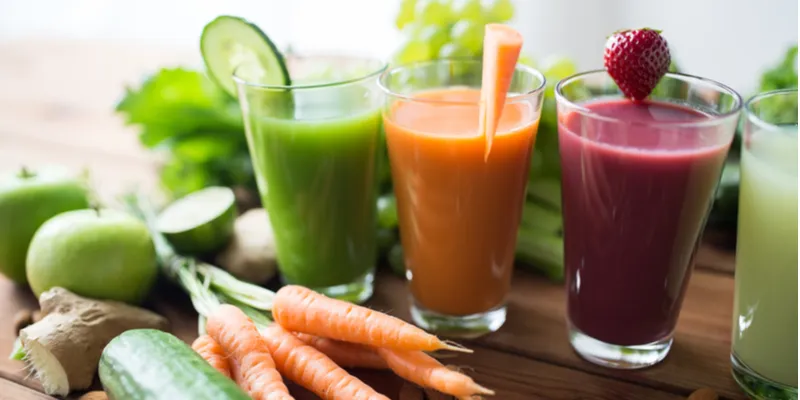
Juices have different effects on different people
This is just not true! The healthiest of ingredients can be magical for one person and dangerous for another, and this is where bio-individuality comes into play.
You might be under the impression that no one can have a problem with leafy greens or that it is the magical ingredient for everyone. The truth is that a high level of juiced greens can be loaded with Vitamin K, which is a clotting vitamin. This can interfere with any medication that you might be taking such as blood thinners.
The same reaction might not occur if someone on blood thinners simply ate a bowl of sautéed greens. Consuming too many green juices can also raise oxalates in the body, and increase joint pain. Balance is key. Juicing can be an adjunct, added only to complement a good diet.
Juicing all vegetables and fruits
Some vegetables and fruits can be a problem to juice, and this is an area where there is a lot of misinformation.
If you have thyroid challenges, then you should avoid juices with too many cruciferous ingredients. While it is untrue that those with thyroid dysfunction should avoid cruciferous vegetables altogether, it is,in fact, true that juicing these vegetables and removing the fibre can create a problem.
If you suffer from tummy troubles or IBS, you need to remember that apples, pears, beets, leeks and cabbage can cause bloating and pain. If you suffer from skin conditions such as eczema, rosacea or urticaria, pineapples, strawberries and lychees can cause a reaction.
Oxalates found in beets, spinach, berries, kiwi fruit and almonds can cause problems for those prone to frequent bladder challenges or those with high uric acid. Oxalates can also interfere with iron absorption.
Juicing the right way
The best way to enjoy juicing is to remember that juices are not the answer to everything. Rotate the ingredients all the time. No ingredient is super healthy.
In excess, even the healthiest ingredient will become a problem. Avoid looking at juicing as the wonder detox.
Find a balance
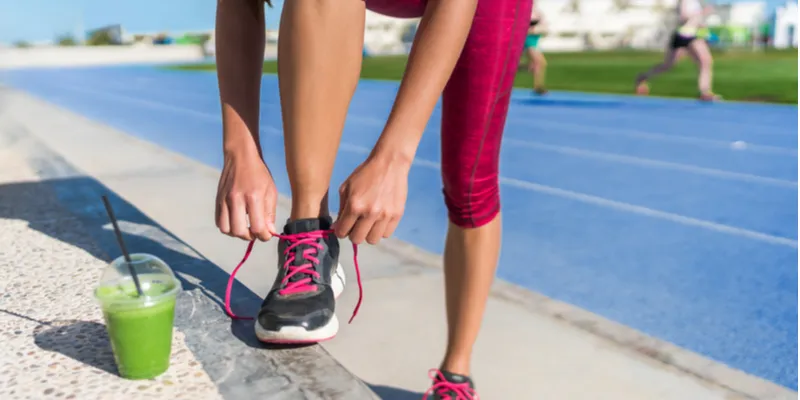
Juices can give you an energy boost
If you want to add juices to your diet, learn not to overdo it by drinking juice all day long. Always be aware of what your juice contains. If you have any allergic reactions that you need to track, be on your guard. It is also very important that you avoid allergic foods so that your immune system remains strong and does not fall prey to COVID-19.
(Images credit: Shutterstock)
Edited by Asha Chowdary
(Disclaimer: The views and opinions expressed in this article are those of the author and do not necessarily reflect the views of YourStory.)









